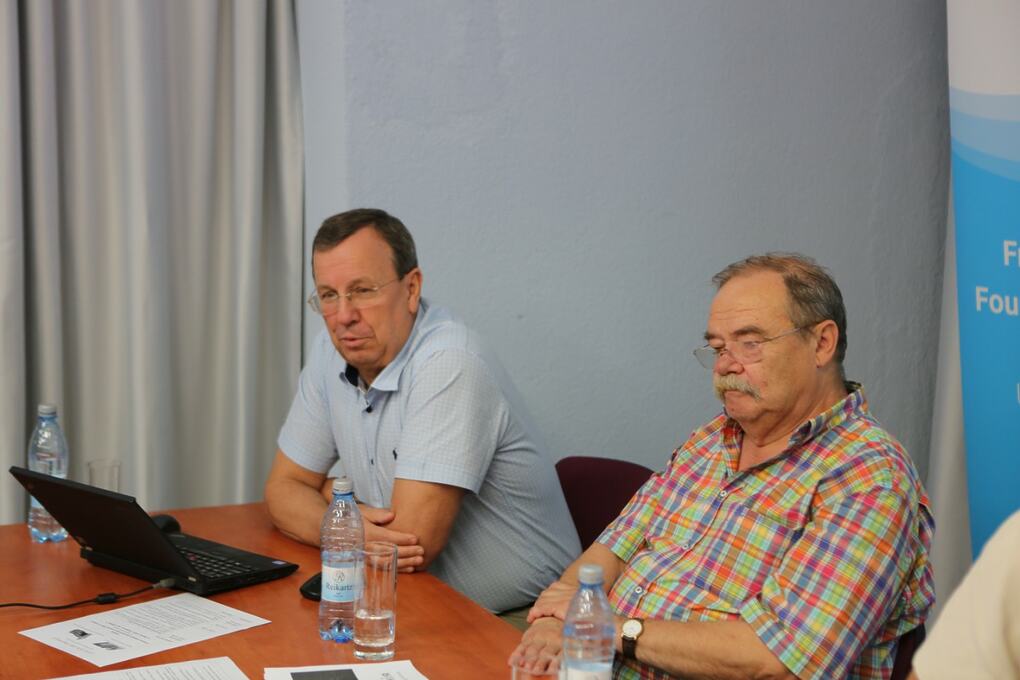
What should be materials about war and who are journalists at war? Whose interests should they serve: of the audience or state? These and other discussing issues were addressed at the workshop “World Journalistic Standards during War and Crisis” that took place in Kharkiv, August 1-2. The event was conducted by the Academy of Ukrainian Press in cooperation with the National Association of Journalists of Ukraine (NAJU) with the support of Friedrich Naumann Foundation for Freedom. Serhii Tomilenko, NAJU Chairman, Valeriy Ivanov, President of AUP, and Volodymyr Mostovyi, longstanding Head of Journalistic Ethics Committee and founder of newspaper “Dzerkalo Tyzhnia” (“Weekly Mirror”) were present at the event as media trainers.

The workshop was dedicated to requirements for materials on armed conflicts, peculiarities of material presentation, using terms, and avoiding hate speech, judicial and ethical moments for journalistic activity, search for information sources, methods of data collection, data manipulation and other aspects.
Concerning the use of hate speech in media, Volodymyr Mostovyi gave an example from the Soviet history when the articles contained such headlines as “Kill the German”.
“Currently, it’s hard to imagine that, for example “Holos Ukrayiny (Voice of Ukraine, newspaper) will release the material titled as “Kill the Russian,” he mentioned.
However, according to Mr. Mostovyi, a connotation of each term matters. For instance, “militants” for events in the East of Ukraine can have a negative connotation, and “rebels” – a positive one.
Workshop experts also emphasized that professional principles cannot be ignored for the “goal of more importance” as it will only harm the state. Patriotism in journalism should not be mixed up with the “loyalty journalism” and close one’s eyes on violations done by the state.
“If one can hardly be unbiased, it is important to put down the pen and go to defend the country,” pointed out Valeriy Ivanov
“Terminology is a technical thing, but during the war it turned into a fundamental thing for us, and it does not find consensus in the journalistic environment. Our media frequently use the word “Terrorists”. It looks logical, because the anti-terrorist operation means that there are terrorists. However, why is this term concerning events in the East of Ukraine not used in any other country? Because their definitions are much closer to reality. A journalistic definition should be emotionally neutral as information coverage must not be interfered by emotions in news genres,” told Valeriy Ivanov
“Patriotism and professionalism are discussing issues which frequently provoke the conflicts in journalistic environment,” remarked Serhii Tomilenko, Chairman at the National Association of Journalists.

“Unfortunately, we can often see that journalists give labels to each other, blame other media because of their opinion,” mentioned Serhii Tomilenko, “though, general insecurity of Ukrainian journalists does not favor professional journalism. Colleagues just frequently have to follow self-censorship to avoid persecution or harassment. The impunity for crimes against journalists is also one of the reasons that affect the quality of journalism.
Local journalists complained that much difficulty of their activity is caused by the Russian TV channels which are watched by the audience (location was near the border with Russia). So, for people it is harder to stand against the Russian propaganda and deny fakes. Main problems of the local media landscape include one-sided information coverage and cases of hate speech use. There is a lack of content for internally displaced people. Journalists need more knowledge on conflict-sensitive journalism.
A huge three-year joint project of the Academy of Ukrainian Press and Friedrich Naumann Foundation for Freedom (with the supported of the Ministry of Foreign Affairs of Germany), is aimed at increasing of qualification level among Ukrainian journalists. The event is organized by the Academy of Ukrainian Press in cooperation with Friedrich Naumann Foundation for Freedom with the supported of the Ministry of Foreign Affairs of Germany.
Gefördert durсh die Bundesrepublik Deutschland
With the support of Federal Republic of Germany
